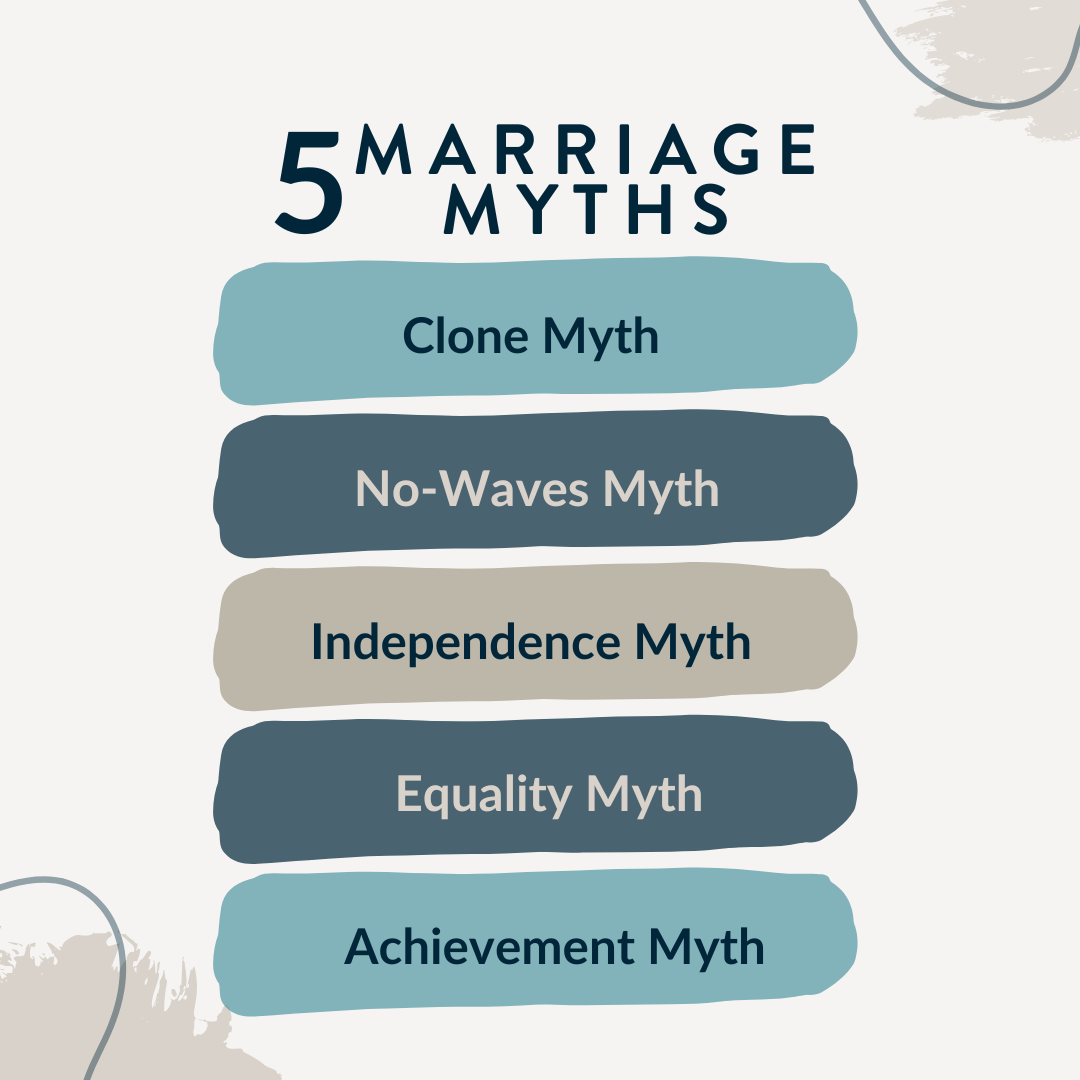
Place caption here
5 Marriage Myths
Misconceptions can become deeply ingrained beliefs, leading to myths that can cause problems in everyday life. On our podcast, Richard and Linda Eyre discussed five marriage myths: the Clone Myth, No-Waves Myth, Independence Myth, Equality Myth, and Achievement Myth. When we are aware of these myths, we are better able to maintain a healthy marriage.
The Clone Myth
When in the process of choosing someone to marry, we often focus on the similarities we share with our dating partner. We tend to measure our potential marriages by how alike we are to our partners and how seldom we disagree. Yet, if we succeeded in finding a perfectly similar partner, our marriage would manifest as uninteresting, unhappy, and unfulfilling. Some of the strongest marriages are between two strong individuals who revere, rather than resent their differences. They are couples who can have their own unique opinions, can disagree, debate, and learn from each other. The way you resolve issues is a much better measure of your marriage than how often you need to resolve them.
The No-Waves Myth
When administering advice on conflict, there are two cliches that are often given to young newlyweds. 1) Some things are better left unsaid, and 2) unexpressed feelings never die. These two contradictory phrases cannot exist in tandem with the other. The first cliché works well in business settings. However, the second one is how marriages can best grow and be strengthened.
A marriage with no waves is like a stagnant pond. When there is no motion, all kinds of algae start to build up to where the water is no longer clear or pleasant to swim in. Waves are what clear the water. They refresh and give new vitality. When we’re angry with our partner, it might be tempting to just leave it alone. However, ignoring the issue does not work. As Steven Covey said, “unexpressed feelings never die, they just get buried and come forth later in uglier forms.” Communication with our spouse is key to making sure we don’t clutter our relationship with metaphorical “algae.”
The Independence Myth
Communicating to coordinate and compromise with our spouse is a message that might be met with resistance. Today’s societal expectations seem to be ever-focused on our individuality and independence. However, this culture of “independence-at-all-costs” might be one of the biggest threats to successful marriages because marriages thrive best in interdependence rather than independence. As couples trade their ego and pride for love and concern for the happiness and well-being of their spouse, marriages are elevated. Commitment to your spouse is what gets you through hard times. Giving up your independence and trading it for interdependence with your spouse provides a way for both partners to give and receive the maximum amount of happiness.
The Equality Myth
To achieve the goal of giving and receiving happiness, married couples might think that equality of roles and opportunities would be the best course of action in their households. However, when we try to make everything equal, we tend to “keep score”, which acts as a catalyst for building resentment towards our partners when we fail to keep things equal all the time. There will be times when our spouse has more going on than we do and so we are expected to pick up the slack when they cannot give of their time and energy and vice versa.
There is something higher than equality, and that is synergy. Rather than thinking in terms of sameness, perhaps we ought to be thinking in terms of “oneness.” The yin-yang symbol is a good example of this. Each half has its separate place, and yet complete each other where the other lacks. So too should a marriage relationship be.
The Achievement Myth
Many people’s goals center around achievements, mostly because they are measurable and quantifiable. But a relationship can feel more ethereal and so can be difficult to measure. However, all a goal is, is a clear vision of something the way you want it to be in the future. Successful relationships don’t get the same recognition that achievements do. But while both require goals to be set, a relationship requires being actively aware of your goal for your entire marriage. No one is going to give you an award for staying on top of it, but you will certainly be rewarded with a healthier and happier marriage. The reward just comes bit by bit, not as something that can be achieved because you’ve hit all the right benchmarks.
Concluding Thoughts
Some of these myths mentioned could be contradictory to what you might have thought would be required in a marriage. However, for a marriage to be successful, we cannot treat it as commonplace and use the same tactics we would for a business transaction. A marriage relationship requires something special to truly be successful and that is synergy. Use your differences to your advantage and work together to create goals to live the marriage of your dreams.
Resources
https://extension.usu.edu/strongermarriage/podcast/episodes/015CounteringMarriageMyths

